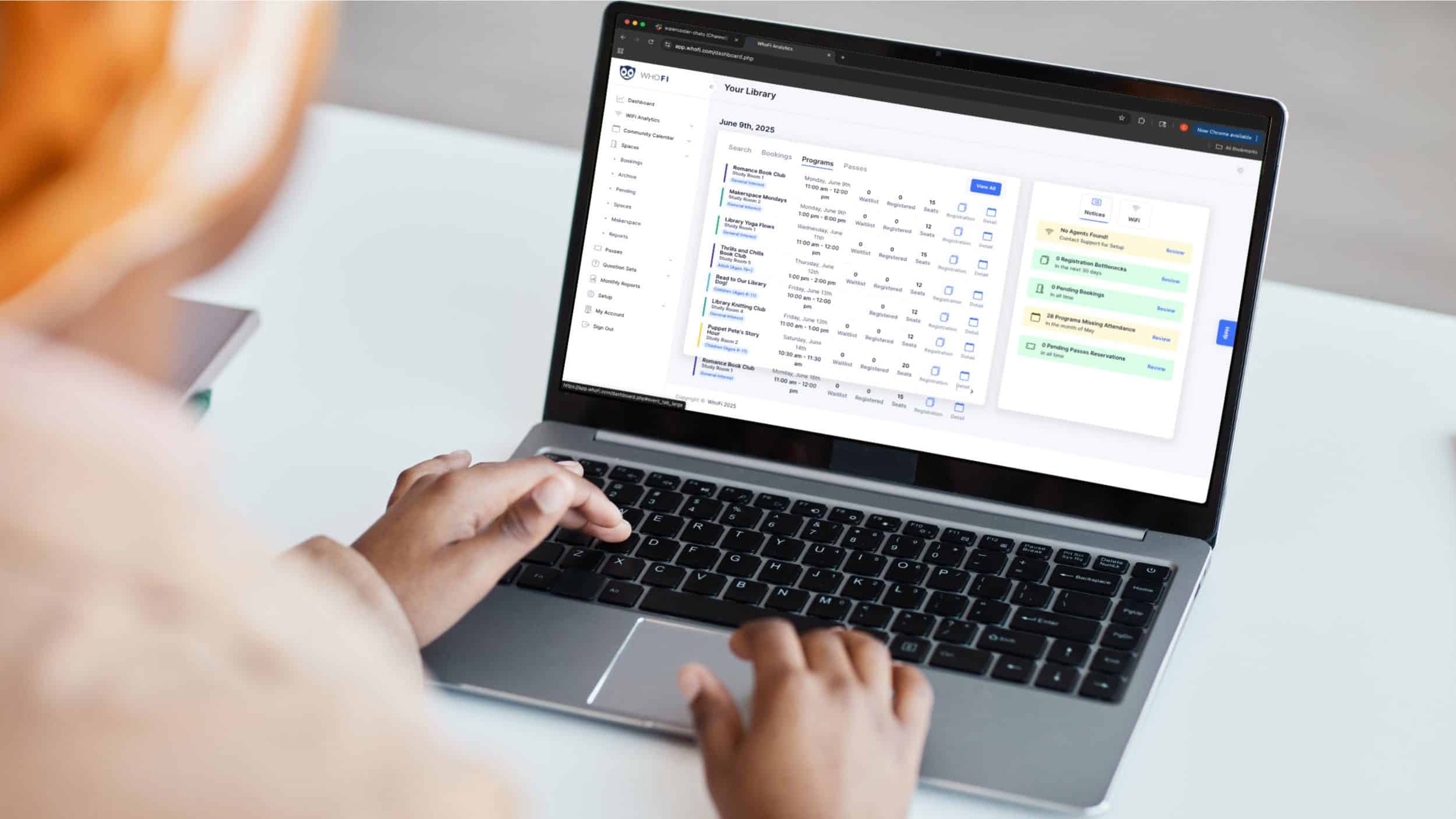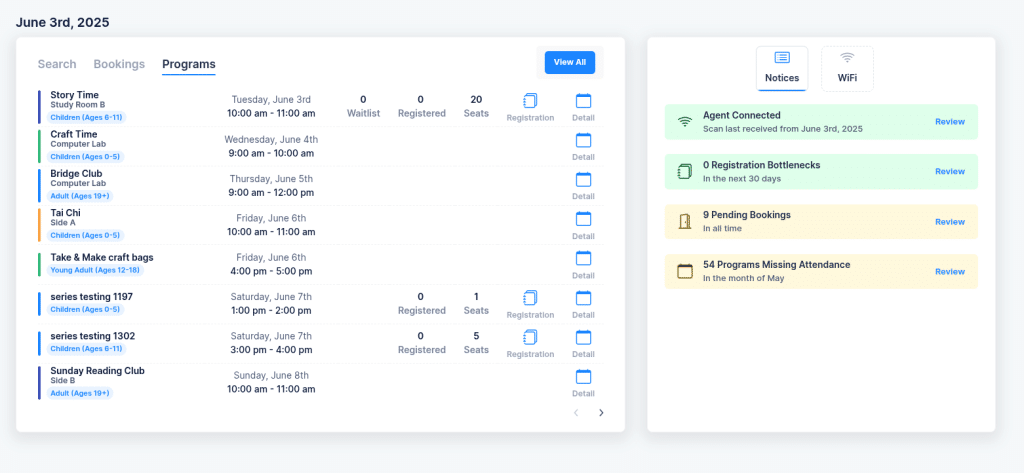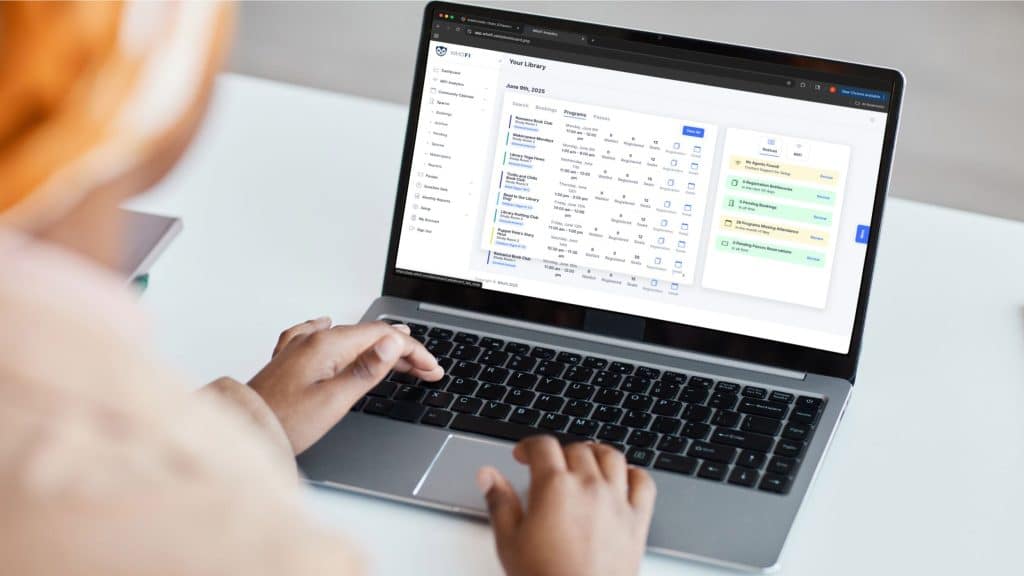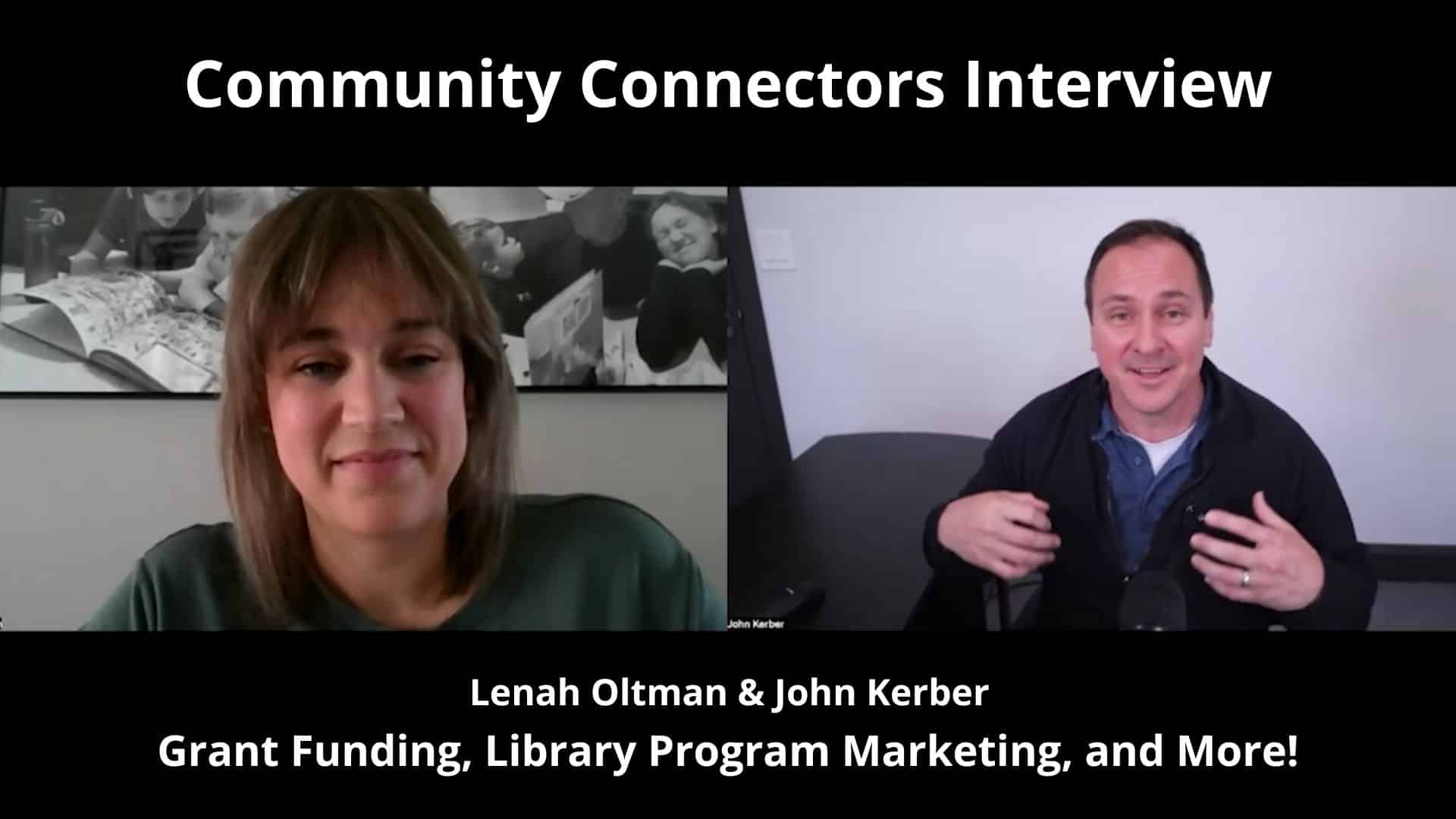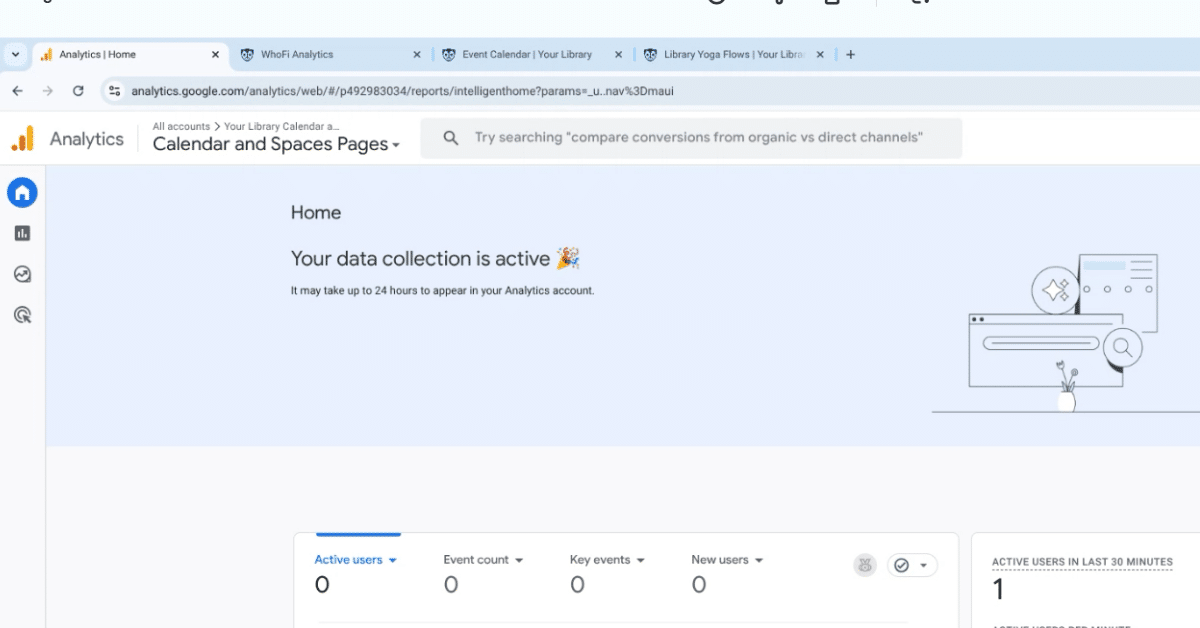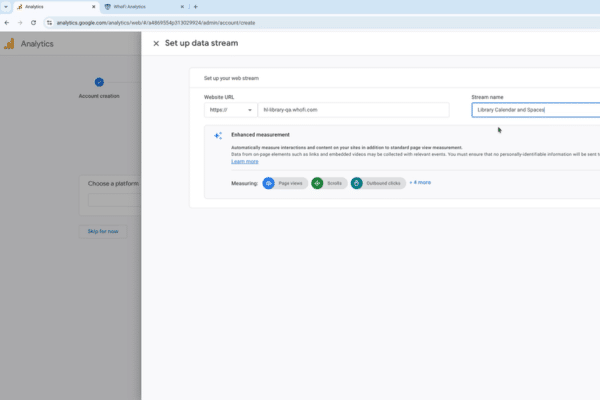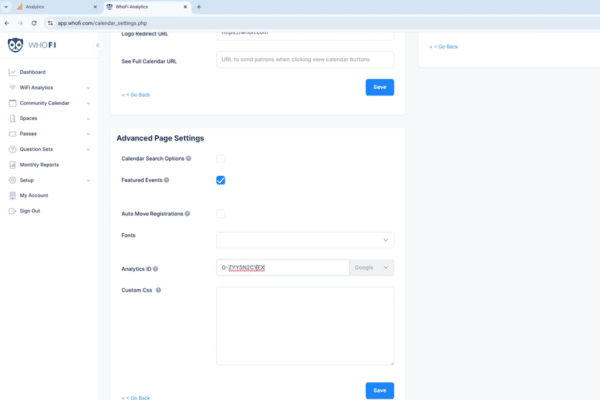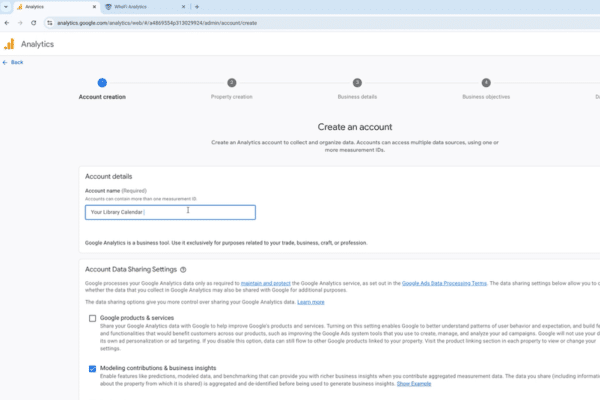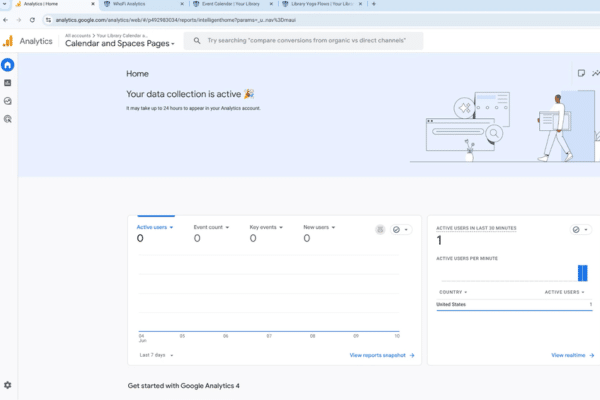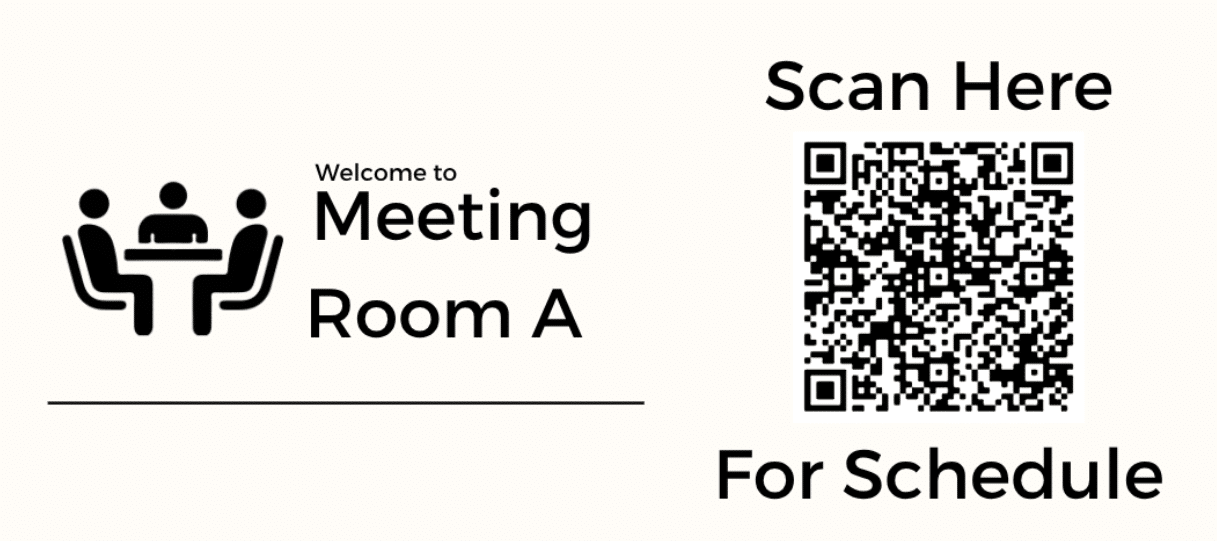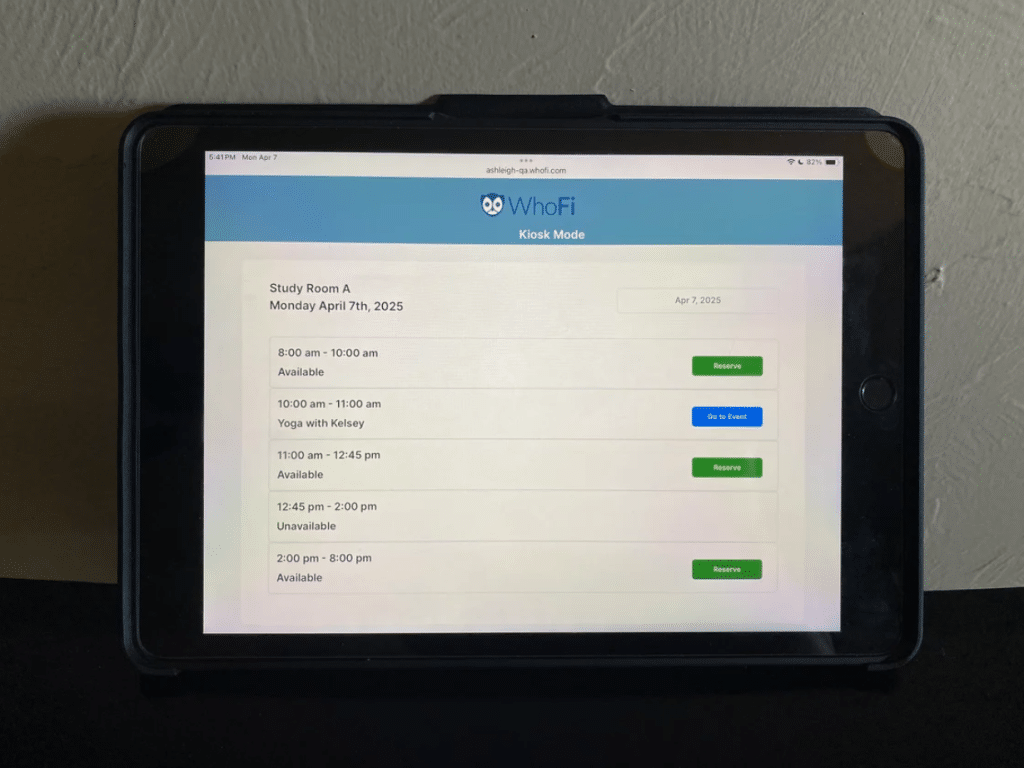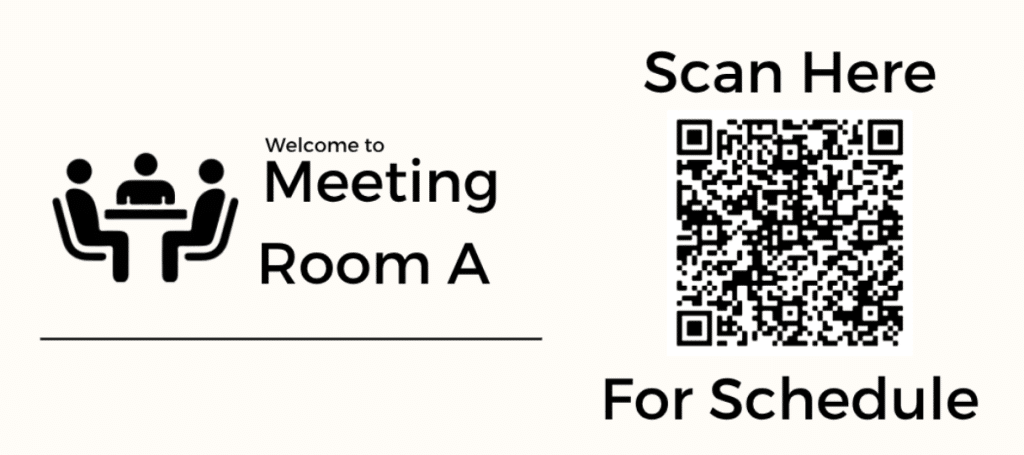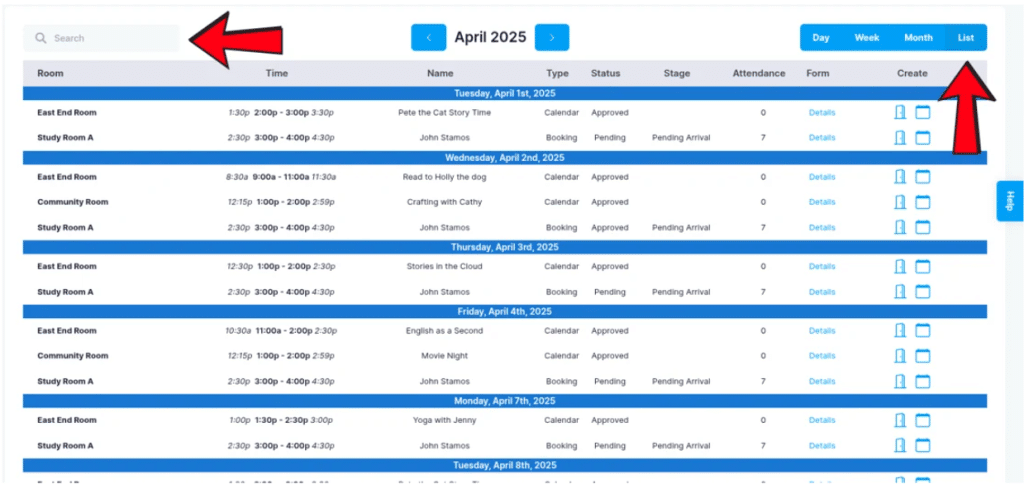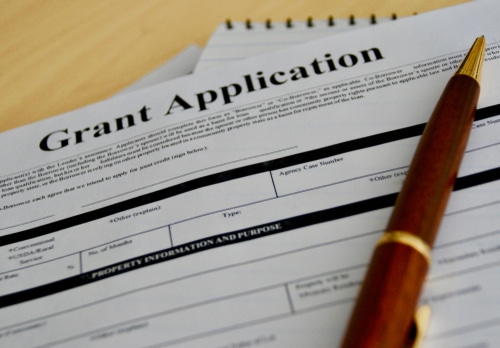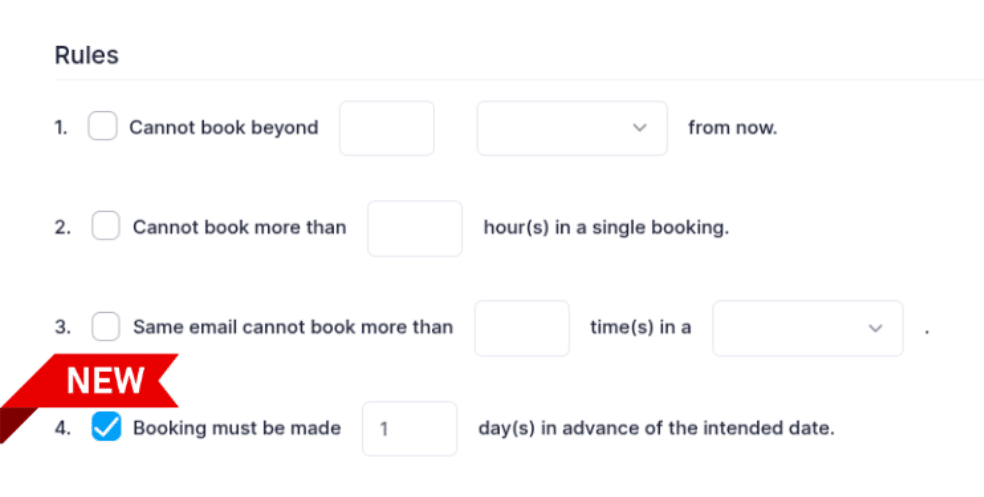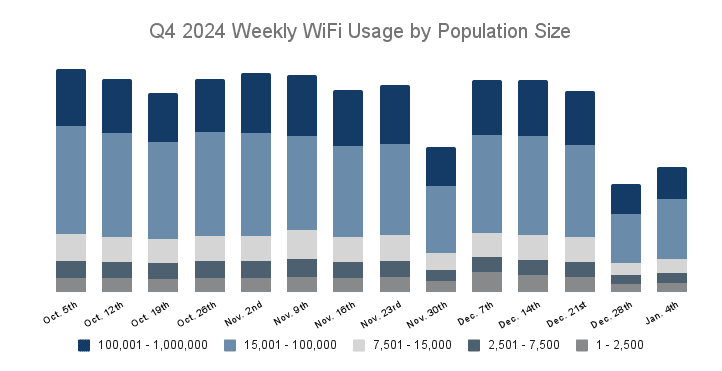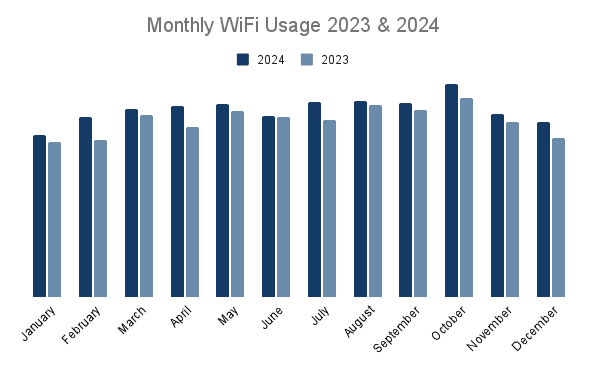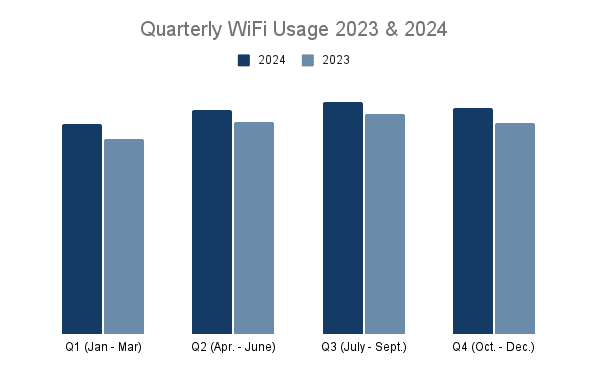Meet the New Dashboard: Smarter, Simpler, and Built for Libraries
At WhoFi, we’re always listening to the libraries we serve—and that feedback just helped shape something big. We’re excited to introduce a redesigned WhoFi Dashboard built for libraries and community spaces. It makes it easier than ever to manage your spaces, programs, and services all in one place.
Designed to Support Your Daily Work
Managing programs, room reservations, and maker space usage can get complicated fast. That’s especially when relying on paper registrations and calendars that can lead to double bookings. That’s why we’ve refreshed the dashboard with a focus on clarity, usability, and speed—so you can find what you need and get back to serving your patrons.
Here’s what’s new:
- Search View – Find patrons, events and bookings instantly with the search feature.
- List Views – Gain a birds eye view on all of your upcoming events.
- Notices – Stay ahead reminders to enter attendance or approve pending bookings.
This new layout is built to support clarity and function so that library staff can find the information they need quickly and easily.
Want to Learn More?
If you’re already a partner, all you need to do is login to start saving time with the new dashboard. Curious about the WhoFi Dashboard and full Suite of Services built for libraries and other community spaces? We’d love to chat! Reach out to us at marketing@whofi.com or click the button below to schedule a meeting.
BOOK A DEMO
Community Connectors Interview - Lenah Oltman and John Kerber
Community Connectors Episode 1 — Recap
In this 45-minute kickoff episode, host John Kerber sits down with Lenah Oltman, the director who took Reinbeck (IA) Public Library from a modest program lineup to a community engagement engine. The conversation zeroes in on two themes listeners kept asking for:
-
Funding that Fuels Growth
-
Hear how Lenah turned data from a single successful program into a $7.8 K seed grant, then used that win to secure broader city support.
-
-
Library
Marketing That Moves People-
From Baby Story Time and Teen targeted programs to Canva flyers, café table-tents, and more, Lenah outlines the low-cost tactics that keep patrons—and city leaders—excited.
-
Why Watch?
You’ll leave with a clear blueprint: start with one community-focussed program, tell that success story to funders, and echo the message everywhere your community already hangs out.
▶️ Catch the full interview below or on YouTube and grab ideas you can apply to any library, museum, park, or makerspace.
https://youtu.be/BMDfNTBRn0w
Find What Works: Google Analytics for Library Outreach Understanding
Why Google Analytics Matters for Libraries
Today’s libraries are more than just buildings, they’re vibrant community hubs. From story‑times and author talks to coding clubs, homework‑help, and Spaces reservations—every interaction is an opportunity to connect with patrons. Yet many libraries still rely on anecdotal feedback to assess which library outreach and promotional efforts are successful.
Google Analytics 4 (GA4) bridges this gap by delivering real-time, actionable insights into how patrons discover and engage with your services online through library outreach or other means. When GA4 is connected to both the Community Calendar and Spaces (formerly Meeting Rooms), you gain the power to:
- Identify your most effective promotional channels – Understand whether patrons are finding events via Facebook, local news sites, or organic search results, and direct to the website traffic and double‑down on what works.
- Measure event and room demand before it happens – For programs that are open to the public page views, link clicks, and time‑on‑page provide early signals of community interest so you can adjust room size, staffing, or seating layouts.
- Compare program attendance & room usage – Identify which event types or room configurations generate the most engagement to allocate resources accordingly.
- Report impact with confidence – GA’s insights make a great additional report material to show the board, Friends group, or funders exactly how many people you’re reaching.
- Refine future programming and space management – Discover patterns such as peak booking hours for study rooms and plan schedules that resonate.
When your calendar and Spaces portal are discoverable on Google and measured with Google Analytics, every interaction becomes a data‑driven opportunity to serve patrons better.
Step‑by‑Step: Connecting Google Analytics to WhoFi
https://youtu.be/lwxg9mnzAKs
Good news: The same GA4 Measurement ID powers both tools—set it up once and WhoFi will stream data from your calendar and Spaces reservation pages.
If You Already Use Google Analytics (GA4)
- Create your new Measurement ID
- Sign in at analytics.google.com.
- At the top click Account › Property.
- In the bottom left click Admin Settings.
- Select Data Streams on the right panel.
- In the top right click Add Stream › Web
- Find your full calendar URL in your WhoFi account under Setup › Advanced › Calendar Integration. Remove the "/full" at the end of the copied URL.
- Select your Web stream and copy the Measurement ID (format: G-XXXXXXXXXX).
- Add the ID in WhoFi
- Log into your WhoFi Dashboard.
- Go to Set up › Advanced › Calendar Settings.
Scroll down and paste the Measurement ID in the Analytics ID field provided, make sure Google is selected as the source, and click Save.
- Verify
-
- Back in GA, open Real‑time reports, then refresh your calendar or Spaces page. You should see live visits within 15-30 minutes.
If You’re New to Google Analytics
- Create a Free GA Account
- Visit analytics.google.com and sign in with your library’s Google account.
- Click Admin › Create Account and follow the prompts.
- Set Up a GA4 Property
- Under the new account, choose Create Property and keep the default GA4 selection.
- Add a Web Data Stream
- Follow the instructions above for creating a new Web Data Stream and connecting to your WhoFi account.
Tip: Google Analytics starts collecting data as soon as the ID is saved. You’ll see real‑time visits within the hour and richer insights (traffic sources, geography, device types) after 24–48 hours.
Making the Most of Your Library Outreach Data
-
Build custom reports that group Community Calendar events and Spaces reservations by category to see, for instance, whether Adult Literacy workshops or Group Study Rooms draw more new visitors to the website.
- Set up conversions such as “Registered” or “Reserved Space” clicks to track not just page views but actual patron reservations and registrations.
- Schedule automated summaries to land in your inbox before monthly board meetings.
We’re Here to Help!
- Current partners: If you have any questions about setting up your new account please don't hesitate to reach out at support@whofi.com.
- New to WhoFi? Discover how our community intelligence tools—including Community Calendar and Spaces—can elevate your outreach. Email marketing@whofi.com or visit our demo page.
Data shouldn’t be daunting. With WhoFi, every click and every booking tells a story—let’s make your library's a bestseller.
Introducing Spaces: Supporting the Evolving Needs of Libraries
The evolving needs of libraries as hubs of innovation, creativity, and community, require tools that evolve with them. That’s why we’re excited to announce that our Meeting Rooms feature is getting a new name: Spaces.
Why the Change?
Over time, we’ve had the opportunity to learn more about the incredible variety of environments libraries make available to their patrons and reserve internally. It’s not always about study rooms or conference tables anymore. Libraries reserve maker spaces, recording studios, reading pits, outdoor gardens, exhibit rooms, and more for both patrons and internal programs. Each space is designed to support different forms of learning, collaboration, and engagement.
These aren’t just meeting rooms. They’re flexible, purpose-driven spaces that reflect the unique needs of each community.
New Tools for a Broader Vision
Alongside the name change, we’ve released a number of updates to better support how libraries manage these diverse spaces:
- Room Categories – Filter and label rooms by type, helping both staff and patrons navigate what's available and what is needed for programs.
- Custom Booking Rules – Set specific rules on when and how patrons can reserve a space, customized per room.
- Maker Space Reservations – Many maker spaces include fixed equipment like 3D printers, sewing machines, or recording gear. Recent updates ensure that patrons have the resources they need while allowing staff to manage specialized equipment reservations effectively.
- Study Rooms – Directors offering quiet study or small group rooms can quickly review and approve bookings, while patrons benefit from automated email reminders that help reduce no-shows and ensure everyone makes the most of their reserved time
These updates give libraries more control and clarity while making the patron experience smoother and more intuitive.
What This Means for Current Partners
If you're already using our Meeting Rooms feature, rest assured that everything you're familiar with is still here—just improved. The first change you’ll notice is that the section previously labeled “Meeting Rooms” in your dashboard now reads “Spaces.”
All your existing reservations, settings, and data remain unchanged. What’s new is a name and interface that allows easier management and a breadth of what libraries offer today.
Looking Ahead
We’re grateful to the libraries that inspired this update. Your creativity and community leadership continue to shape how we build our services. As always, we’re here to support the evolving needs of libraries—and we’re excited to see how you’ll use Spaces next.
Have feedback or questions about Spaces? We’d love to hear from you. Existing partners can email support@whofi.com and libraries interested in learning more about WhoFi can reach out at marketing@whofi.com.
https://youtu.be/WYn8METYBdw
Empowering Libraries: Practical Library Advocacy Ideas for Uncertain Times
In today’s landscape, many libraries face a growing challenge: doing more with the same or fewer resources. Funding uncertainty has become the new normal. While the services libraries provide are essential on their own, securing support often requires going a step further—demonstrating that impact in ways boards, grant providers, and the broader community can easily see and understand. Fortunately, with the right strategies and tools, libraries can streamline their operations and amplify their advocacy efforts. In this post, we’ll explore practical library advocacy ideas that help showcase impact, save staff time, and strengthen library support.
The Challenge: Doing More with Less
Libraries are community cornerstones, providing essential programs, spaces, and technology access. Yet many are seeing stagnant or declining budgets, even as community needs grow. Staff are asked to maintain (or expand) services while also producing the reports needed to secure funding or justify budgets.
This dual burden—serving the community while advocating for resources—requires libraries to work smarter, not harder.
Library Advocacy Ideas to Strengthen Your Impact
Strong advocacy doesn’t happen by accident; it’s built on consistent communication, clear data, and community stories. Here are several actionable library advocacy ideas to help meet today’s challenges:
- Data-Driven Storytelling: The most powerful funding cases begin with stories—stories of real patrons relying on library services for internet access, job research, homework help, or community connection. When these stories are paired with data—such as how many patrons use WiFi, attend programs, or reserve rooms—the narrative becomes even stronger and harder to ignore.
- Simplify Service Management: A centralized dashboard where staff can manage programs, room bookings, WiFi analytics, and reporting saves time and reduces administrative strain, allowing for a sharper focus on community service.
- Enhance Patron Access: By making it easy for patrons to reserve rooms, register for events, and access services online, libraries demonstrate responsiveness to community needs—an important metric for funders.
- Get Noticed by Stakeholders: Clear, visual reports that show community impact help libraries stand out to city councils, boards, and potential grant providers. When stakeholders see the value a library brings, they're more likely to recognize it as a worthy investment.
- Grant Readiness: Having easily accessible data and impact stories positions libraries to act quickly when new grant opportunities arise.
These advocacy strategies not only strengthen your case for funding but also deepen your library’s relationship with your community.
How WhoFi Supports These Library Advocacy Ideas
We’ve heard from library partners about the increasing pressures they’re facing—from limited staff time to growing funding challenges. That’s why we’ve built tools designed specifically to support modern library operations and advocacy.
Our Community Intelligence platform empowers libraries to simplify workflows and amplify their impact, all through one centralized dashboard. Libraries can easily manage programs, room reservations, WiFi usage, maker spaces, and reporting in one place. Staff save valuable time, patrons enjoy easier access to services through your website, and library leadership gains the actionable insights needed to demonstrate community value.
With easy-to-understand reporting, libraries can tell a compelling story backed by real-world usage and engagement data. These insights become powerful tools for grant applications, budget meetings, and other stakeholder updates—helping libraries secure the support they deserve.
Libraries nationwide are already using WhoFi’s solutions to prepare for funding conversations and build a stronger foundation for the future.
Preparing for Tomorrow, Today
In a climate of funding uncertainty, advocacy isn’t just an option—it’s essential. Implementing effective library advocacy ideas now better equips your library to weather challenges and continue to serve your community.
If you’re looking for ways to simplify workflows, strengthen your funding case, and advocate more effectively, we’re here to help. Let’s connect and explore how WhoFi can support your library’s mission.
BOOK A DEMO
6 New Ways WhoFi is Making Library Room Reservations Easier
Day‑to‑day feedback from librarians and staff using WhoFi in the field drives everything we build. These six enhancements grew directly out of that partnership, giving libraries—and any hybrid community space—smarter tools for managing room reservations, resources, and patron demand. Check out our library room reservations improvements below, or watch the video here.
-
Kiosk Mode for Rooms
Give patrons an instant snapshot of room availability the moment they walk through your doors. Kiosk Mode lets staff display a live schedule on any tablet or monitor and even allows on‑the‑spot bookings when a space is free.
-
Kiosk Mode via QR Code
No spare screens? Print a flyer with a unique QR code instead. Patrons simply scan, view the real‑time schedule on their phones, and reserve an open room in seconds.
-
New Booking Schedules: Week & List Views
Whether you’re planning next week’s events or need a quick, scrollable list of upcoming reservations, two new calendar views make it easier to spot open time slots and create bookings in a single click.
-
Export Bookings to CSV
Need a custom report for a board meeting or community grant? Download filtered booking data—complete with notes and form responses—straight to CSV for quick analysis and printing.
-
Prevent Same‑Day Bookings
Set how many days in advance you would like patrons to be able to reserve rooms (e.g., 24 hours) so staff have time to prepare rooms and resources. It’s a simple safeguard against last‑minute surprises.
-
Tagging Meeting Rooms
Group spaces with tags like Study Rooms, Makerspace, or Outdoor. Staff can filter by tag today, and patrons will soon be able to do the same on public booking pages—making the right space even easier to find.
These updates were added to keep libraries thriving as patron needs surrounding library room reservations evolve. Ready to see them in action? Visit whofi.com/demo to schedule a meeting and live walkthrough.
BOOK A DEMO
5 Tips for Creating a Thriving Community Hub
Community hubs such as libraries, museums, parks, and community centers provide invaluable services to local populations. Whether offering educational resources, public programs, or safe gathering spaces, these hubs serve as vital lifelines for social connection, learning, and enrichment. To sustain and grow a thriving community hub, leaders can focus on four critical areas identified in the Thriving Community Space Framework: Events, People, Data, and Resources.
Here are five tips to ensure that your community hub remains a vibrant and inclusive space where people feel connected and empowered.
1. Engage Your Community Hub Through Events and Advocacy
Events are a powerful way to introduce new people to your space and engage existing community members. Well-planned programs and advocacy efforts help raise awareness about the services your hub offers while giving community members a reason to return and stay connected.
- Why It Matters: Events not only attract new visitors but also allow existing members to bring others into the fold. According to research on civic engagement, consistent, relevant programming helps strengthen ties between institutions and their communities (National Civic League).
- Action Tip: Design events that appeal to various demographics within your community. Use both digital and in-person outreach methods to promote your events and encourage attendees to invite friends or family.
2. Empower People to Take Ownership and Lead
A community hub thrives because of the people who bring it to life. Engaged volunteers, organizers, and leaders create a sense of ownership that fuels the longevity of the space. Empowering members to lead programs or volunteer not only lightens the workload but also strengthens the community by fostering belonging and leadership.
- Why It Matters: Volunteerism and participatory leadership cultivate a deeper commitment to a space, encouraging long-term sustainability. Studies show that empowered volunteers feel more connected to the mission and are more likely to advocate for the hub (Points of Light).
- Action Tip: Reduce burdens for staff and train potential leaders within your space. Offer opportunities for volunteers to contribute their skills—whether by leading events, organizing workshops, or participating in advisory boards.
3. Use Data to Guide Decision-Making and Secure Funding
Data provides insights that help community hubs make informed decisions, allocate resources effectively, and advocate for ongoing support. Whether tracking attendance, assessing the success of programs, or gathering feedback, data ensures that your space remains relevant and responsive to community needs.
- Why It Matters: Data-driven decision-making is essential for ensuring that nonprofit organizations meet their goals and secure future funding. Demonstrating impact through data also strengthens relationships with funders and stakeholders (Urban Institute).
- Action Tip: Use platforms like WhoFi to collect and analyze data on attendance, program outcomes, and user satisfaction. Regularly review this information to adjust programming and present findings to boards or funders.
4. Optimize and Promote Your Available Resources
Resources are the foundation of any community hub. Whether offering a library’s book collection, a park’s open space, or a maker space’s 3D printers, ensuring that these resources are accessible and well-maintained is key to keeping the community engaged.
- Why It Matters: Accessible and well-utilized resources provide direct value to the community, reinforcing the importance of the hub. When community members recognize the tangible benefits of the space, they are more likely to support and advocate for its continued operation (IMLS).
- Action Tip: Regularly assess your available resources and promote them through signage, outreach, and online platforms. Create or utilize a system that tracks resource usage to ensure equitable access and inform decisions about future investments.
5. Share Knowledge and Best Practices Through Platforms Like Community Connectors
Community hubs do not thrive in isolation—learning from other community leaders helps strengthen your space and ensures long-term sustainability. Platforms like Community Connectors enable space managers to share ideas, discover best practices, and connect with others who are equally passionate about empowering local communities.
- Why It Matters: Collaborative knowledge-sharing amplifies the impact of community hubs by enabling leaders to replicate successful models and innovate within their own spaces (Mainstream Nonprofit Solutions).
- Action Tip: Join Community Connectors to engage with a network of leaders who are actively improving and advocating for hybrid community spaces. Share your experiences and learn from others to ensure that your hub remains a catalyst for positive change
By focusing on these four key areas—Events, People, Data, and Resources—community hubs can become more than just physical spaces. They transform into vibrant, inclusive environments that serve as pillars of connection, learning, and opportunity. Through platforms like Community Connectors, community leaders can exchange ideas and inspire one another to build stronger, more resilient hubs that serve their communities for years to come.
JOIN THE COMMUNITY
https://youtu.be/Wydhp6UzSMs
How to Streamline Library Annual Report Completion
Libraries play a crucial role in their communities, but behind the scenes, staff members face a significant challenge: collecting and reporting service usage efficiently. Many libraries have struggled with outdated methods, such as spreadsheets and paper form tabulations, that take up valuable time and energy. However, with the implementation of WhoFi’s Question Sets, libraries are transforming the way they collect and utilize information to make informed decisions and complete the library annual report.
The Challenge: Time-Consuming Data Collection
Before using Question Sets, libraries relied on complex, time-consuming methods to track things like program attendance, service desk requests, and study room usage. Many reported spending countless hours manually compiling information, which left little to no time for analyzing trends and planning for the future.
"Gone are the days of keeping Excel spreadsheets." – Jonatha
"Each month, gathering my data took hours, multiple emails, and several spreadsheets to get the information into a usable format." – Susan
"Before QS, I had staff put their data into a spreadsheet, then I would take that data and put it into a Word document just to make it easier to read. Now, with WhoFi, I get clear reports in just a few minutes." – Annette
Libraries needed a solution that could save them time and make data more accessible for future planning.
The Solution: Simplified State Reporting
One of the biggest advantages of Question Sets is its ability to simplify library annual report submissions. Instead of scrambling to compile data at the last minute, libraries can input information throughout the year, ensuring a smoother and more efficient reporting process.
"Question Sets helps tremendously when it’s time to do the survey. It has been extremely helpful!" – Alison & Jonatha
"No more spending hours, days, and weeks putting the information together." – Amie
With Question Sets, libraries can complete their annual reports in a fraction of the time, eliminating stress and ensuring accuracy.
The Impact: More Time for What Matters
Libraries that have adopted Question Sets report significant time savings, allowing staff to focus on more impactful work—engaging with their communities and enhancing library services.
"Before QS, it took me a full 40-hour work week to complete the survey; now it takes just a day!" – Lisa
"It cuts my reporting time in half." – Sabrina
"I no longer have to lock myself up in my office for the last week in October. The collaboration that QS invites staff into helps everyone contribute to the survey." – Allie
By reducing the administrative burden, libraries can allocate more resources to community engagement and strategic planning.
Through the feedback of library partners, it’s clear that Question Sets is making a tangible difference. It eliminates cumbersome manual library reporting processes, streamlines state reporting, and ultimately frees up staff time for what truly matters—serving their communities.
If your library is still struggling with manual data collection, consider making the switch to a more efficient and effective solution. WhoFi’s Question Sets might just be the game-changer your library needs. Contact us to learn more at marketing@whofi.com or click the demo button below.
BOOK A DEMO
Transforming Library Data Management with WhoFi: Time-Saving, Insightful, and Impactful
Libraries play a crucial role in their communities, providing valuable resources, services, and programming. However, the administrative side—library data management, compiling reports, and justifying funding—can be overwhelming. That’s where WhoFi comes in, revolutionizing how libraries collect, manage, and present their data.
From small rural libraries to large urban institutions, WhoFi’s Question Sets is transforming the way staff manage statistics. It is saving hours of manual work while providing accurate and actionable insights. Here’s how libraries across the country are benefiting from WhoFi.
Simplifying Data Collection & Reporting
Many libraries previously relied on Excel spreadsheets, manual logs, and paper records to track attendance, reference questions, and computer usage. This made annual state surveys and board reports time-consuming and prone to inaccuracies.
With WhoFi’s centralized data tracking, libraries can:
🤷 Eliminate guesswork and manual tracking – No more averaging numbers or hunting down lost spreadsheets.
🖥️ Easily input data in real-time – Staff can enter visitor counts, reference questions, computer checkouts, and program attendance in one place.
✅ Auto-populate state annual reports – Libraries using WhoFi’s Question Sets have seen reporting time cut in half, with data ready to be transferred into state surveys.
🏢 Quickly generate board and city council reports – A few clicks provide clear, easy-to-read reports, reducing prep time from hours to minutes.
"Prior to WhoFi, we were using Excel, which worked but was difficult to manage each year. Now, we log in and enter our data, knowing it’s safely stored and instantly accessible for reports." - Jonatha Basye, Van Meter Public Library & Brittany Wallace, New Albin Public Library
Empowering Staff & Enhancing Collaboration
WhoFi isn’t just about automation—it’s about creating a more collaborative data culture within libraries. Instead of one person compiling all the statistics, data entry can be decentralized, allowing multiple staff members to input real-time stats without the need for constant oversight.
🤲 Staff collaboration – Everyone can contribute to data tracking, leading to a more accurate representation of library activities.
🧠 Better decision-making – Library data management comes easy, track event attendance, and adjust programming as needed.
🆕 Easier onboarding for new directors – No more deciphering past directors’ notes or digging through multiple files—all data is in one place.
"The annual survey is no longer something I lock myself in my office for the last week of October to complete. Now, it's a team effort!" - Allie Paarsmith, West Liberty Public Library
Driving Better Library Decisions with Data
Libraries using WhoFi have been able to spot trends, justify funding requests, and make data-backed programming decisions.
📊 Track program success & adjust offerings – Seeing lower attendance for adult programs? Try different nights or add Saturday sessions.
📈 Compare year-over-year data – Libraries can now easily compare December attendance to the previous year to measure growth.
💰 Advocate for funding – When applying for grants or requesting budget increases, concrete stats demonstrate impact and need.
"WhoFi’s data helped us secure a $5,000 grant for outdoor space improvements and stronger WiFi. The reports provided the evidence we needed to justify the funding request." - Orange City Public Library, Lisa Johnson
Eliminating the Hassle of Annual Reports
For many libraries, state annual surveys used to take weeks of library data management. WhoFi has turned this once-dreaded task into a streamlined process, with reports that are automatically formatted for state submissions.
⏳ Significant time savings – Librarians noted reporting times cut in half, allowing them to focus on community engagement instead of paperwork.
💡 Accurate statistics for advocacy – WhoFi’s reports help directors confidently present their library’s value to boards, city councils, and stakeholders.
"I was able to finish our report soon after it was open to start. No more spending hours, days, and weeks putting the information together. " - Amie Herrick, Mellinger Memorial Library
Making Library Data Work for You
WhoFi is more than just a reporting tool—it’s a game-changer for libraries looking to optimize operations, better serve their communities, and save time on administrative tasks.
🎯 Easier, more accurate data tracking
⏳ Time-saving automation for reports
ℹ️ Informed decision-making with real-time insights
💰 Stronger advocacy for funding and community support
Libraries across the country are transitioning from outdated tracking methods to a more streamlined, data-influenced approach—and WhoFi is leading the way.
🚀 Want to see how WhoFi can help utilize the data you collect for decision making and advocacy? Contact us today for a demo and discover how you can take express library impact. Reach us at marketing@whofi.com or at whofi.com/demo.
https://youtu.be/Xf9_KbWwReU?si=Gg6q6zZFRL11Hwe2
Annual Analysis of Public Library WiFi Usage 2024
Libraries have always been centers of knowledge and community, but in recent years, patrons have engaged with these vital spaces in ever-more exciting ways. As we reflect on library usage trends in 2024, we celebrate the myriad ways libraries support their communities helped by WhoFi—not only through WiFi Analytics but also with tools like Community Calendar (for program planning, promotion, and registration), Meeting Rooms (for streamlined space management), and Question Sets (for centralizing data and storytelling). Now, in 2025, we look back on the data from the previous year to understand how libraries adapted, innovated, and thrived—building on the momentum from 2024.
Fourth Quarter 2024 Usage on a Weekly Basis
In Q4 of 2024, libraries experienced slightly higher weekly WiFi usage compared to the same period the previous year (2023), even with the typical decreases around Thanksgiving, Christmas, and New Year’s. This underscores patrons’ continued reliance on library-provided internet access for holiday travel planning, online shopping, virtual learning, and staying connected with friends and family.
From study groups and community workshops to festive celebrations the numbers are clear that libraries remained in demand—even amid holiday slowdowns. Looking back into previous quarters it becomes clear that libraries are consistently relied on for internet all year round.
Year in Review: High October Library Usage Trend
A standout observation from 2024 is that October was once again the busiest month for WiFi usage, marking two years in a row (2023 and 2024) where October outpaced every other month. Librarians may point to the combination of back-to-school activities, fall-themed programs, and heightened community engagement events—spanning everything from homework help sessions to Halloween festivities.
The festive draw of October programming combined with the fundamental need for consistent internet access remains central to why so many patrons visit the library. From students working on projects to community members seeking reliable connections for things like job applications, October’s consistent surge in activity underscores the library’s vital role as a technology resource hub.
Quarterly Overview: Q3 Continues to Lead
Despite October’s impressive numbers, a look at 2024’s quarterly totals confirms Q3 remains the busiest quarter overall. This repeats a pattern seen in 2023, likely reflecting the surge in back-to-school preparations (both academic and extracurricular) and robust summer programming that naturally extends into early fall. Meanwhile, end-of-year holiday schedules and traveling can reduce library visits in Q4, though many libraries effectively mitigate this lull by maintaining a steady calendar of community events and services.
In 2024, select libraries were introduced to version 1.0 of WhoFi’s Question Sets, a collaborative effort initiated by State Libraries, public libraries and WhoFi to streamline data collection, organization, visualization and reporting. Some of the goals included supporting data-influenced decision making, advocacy efforts, and to ease the burden of board and annual survey reporting., This marks a significant milestone in all-in-one library service management. By integrating Question Sets with existing WhoFi solutions—such as WiFi Analytics, Community Calendar, and Meeting Rooms— library staff can consolidate all of their data within a single dashboard, simplifying workflows and enhancing both daily operations and long-term planning.
Interpreting Library Usage Trends for 2025
As we look back on 2024 and move forward into 2025, libraries continue to evolve in remarkable ways—adopting new technologies, refining community engagement, and standing firm in their commitment to equitable access. Through WhoFi’s easy to integrate tools—WiFi Analytics, Community Calendar, Meeting Rooms, and Question Sets—libraries can better serve their patrons, promote programs, gather actionable insights, and use data to make decisions that will allow them to thrive for generations to come.
This year’s data reaffirms that libraries are indispensable—not just as providers of internet connectivity but as hubs of community, learning, and opportunity. By staying in tune with patron needs, embracing innovative approaches, and providing welcoming spaces, libraries have consistently proven their resilience and relevance. WhoFi remains committed to supporting library staff, empowering them to make data-influenced decisions that foster stronger connections and more impactful services. As we look ahead to 2025, there’s every reason to be optimistic that libraries will continue to thrive—enriching lives and strengthening community bonds well into the future.
As libraries continue to evolve and thrive in 2025, WhoFi stands ready to support their success. Our mission is to empower library teams with the tools and insights needed to enhance community engagement, streamline operations, and deliver the services patrons rely on. If you’d like to discover how WhoFi can help your library, we invite you to reach out to us at marketing@whofi.com or visit whofi.com/demo to schedule a meeting. Let’s work together to ensure library usage trends remain vibrant, connected, and indispensable community hubs for years to come!

